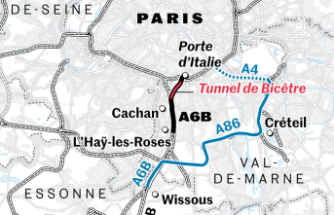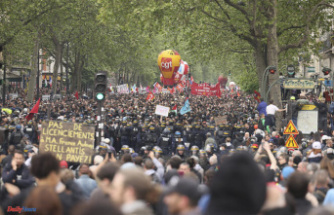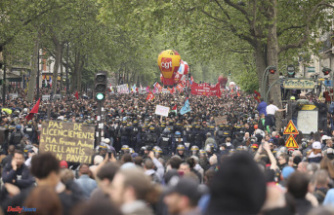A black and white photocopy of the identity document of Sidi Mohamed Talebbuia Abdelyalil certifies that he was one of the Sahrawis who had Spanish nationality during the time when that African territory belonged to Spain. However, the Green March of 1975 caused Talebbuia to abandon his land, take shelter with his family in a refugee camp and lose his nationality and his supporting documents, because in the invasion the Moroccans destroyed everything, including the deeds of his house in El Aaiún and his wife's ID, leading the whole family to a future in tents in the middle of the desert.
All this is told by his young son, Sidi Talebbuia Hassan, from his law office, on Calle Montera in Madrid. This lawyer specialized in immigration addresses EL MUNDO after the deputy of the United Left and leader of the PCE Enrique Santiago presented last Wednesday a bill in Congress to nationalize the Sahrawis who were born during the colonial era and their children that they had. All the parties voted in favor of this proposal except the PSOE, which while from the Executive offered the 94 Nicaraguans who have had their nationality withdrawn the option of being Spanish. "When the socialist leaders come to power, the Sahrawis always look at them with a lot of suspicion," says Sidi.
Sidi -37 years old, a little over six feet tall and with a slight Andalusian touch in his Spanish- came to Spain for the first time in the Holidays in Peace program of the NGO Amistad Saharaui. He repeated two more summers and in 1997 he stayed in national territory with his foster family. «The first years I was in an irregular situation, until 2001 when I obtained the residence permit. Then I went on to ask for nationality. It was a complicated period”, synthesizes the lawyer, who, according to the proposal of United We Can, would automatically have nationality for being the son of a Saharawi born in the colony. Sidi finished high school in the scientific branch: he wanted to be a biologist. However, his enrollment in the university coincided with the Saharawi intifada: "The impotence over the situation was such that I thought of looking for the way to solve our problem in Law, which has legal roots", he says.
His family's story is that of many other Sahrawis who lost their nationality when they left their territories. Although he acknowledges the existence of the Royal Decree of 1976 in which a period was granted for whoever wanted to opt for Spanish nationality, he recalls: «Nobody found out that this royal decree had been promulgated in Spain, among other things because there were no Spanish authority in the Sahara; second, because there was an open war against the Saharawi people and because most of them were in the camps and trying to survive. I think that decree was illegal. If you are already Spanish, you cannot opt for Spanish nationality and the current Civil Code did not allow it.
The occupation after the Green March included the destruction of the documents of thousands of people, which indirectly caused a loss of rights for many. Thus, Sidi's father was not eligible for a retirement pension despite the fact that he appears in the DNI as a soldier and despite having been stationed in the Basque Country, and his wife was not eligible for a widow's pension when the patriarch died in 2000. «All these are the consequences of occupation and abandonment. In the end, these people are sold," concludes Sidi.
According to his account, among the Sahrawis who live in Madrid and in the camps, the Podemos bill has been "received with great commotion". However, he and other colleagues are going to go live through social networks to explain to people that it is not yet a firm decision. "I think that this measure will not go ahead, it will be blocked and will remain in a drawer," he says, not very optimistic.
Adbulah Arabi, delegate of the Polisario Front in Spain, the organization leading the claim for Saharawi independence, in a military confrontation with Morocco and an ally of Algeria, believes that approving this law "contributes to lessening the damage caused by unfinished colonization", as well as that This option to nationalize the Spanish Sahrawis "is a recognition of the legal responsibilities towards the people of the Sahara." However, he recognizes the difficulty of carrying out the proposal of the purple formation, since many Sahrawis do not have supporting documents. "There is no reliable census of the people who could benefit," he explains to EL MUNDO. Through associations and NGOs, they know that between 7,000 and 8,000 compatriots live in Spain and, with DNI, no more than 2,000, but nothing is conclusive. Nor do the government authorities have the data.
Both Arabi and Talebbuia are very critical of the PSOE, the only one that did not vote in favor of the proposal. "It is a consequence of the government's fear of Morocco, this is against a right of the people," he says. «The turn that Pedro Sánchez has taken by accepting Morocco's sovereignty over Western Sahara indirectly was a jug of cold water. It's not something you expect him to be able to do, because he's not even smart. It is giving him something that never belonged to him”, says Sidi, warning that, after the Sahara, they will talk about Ceuta, Melilla or the Canary Islands.
Daniel Ortega, president of Nicaragua, stripped 94 Nicaraguans of their nationality last Wednesday, accusing them of crimes against the homeland and of being "fugitives from justice." The Ministry of Foreign Affairs announced last Friday that the Government has extended the offer of Spanish nationality to these citizens. An offer made by the Prime Minister, Pedro Sánchez, in a letter addressed to the writer Sergio Ramírez, one of those affected by Ortega's decision. Spain has also transferred this offer to the 222 people expelled from Nicaragua last week and it is extended to all those who are in this decision. It happens that this solidarity with Nicaraguans responds to criteria other than those that have led Sánchez and his party to vote against the United Podemos bill to grant Spanish nationality to those Sahrawis who were born in colonial times. .
According to the criteria of The Trust Project












